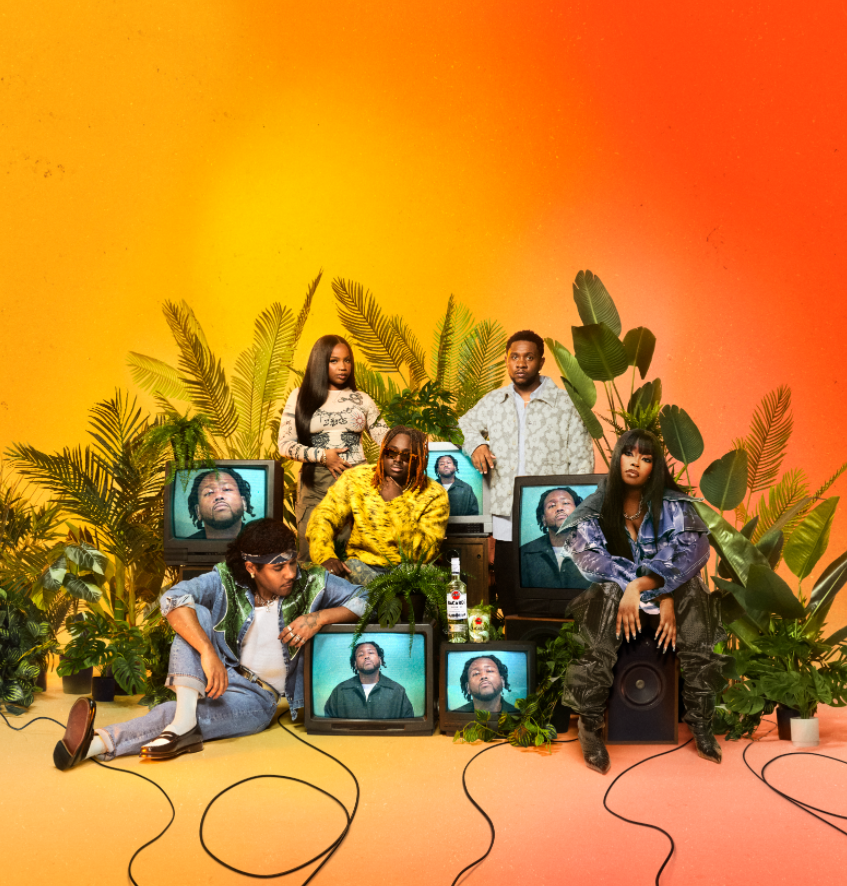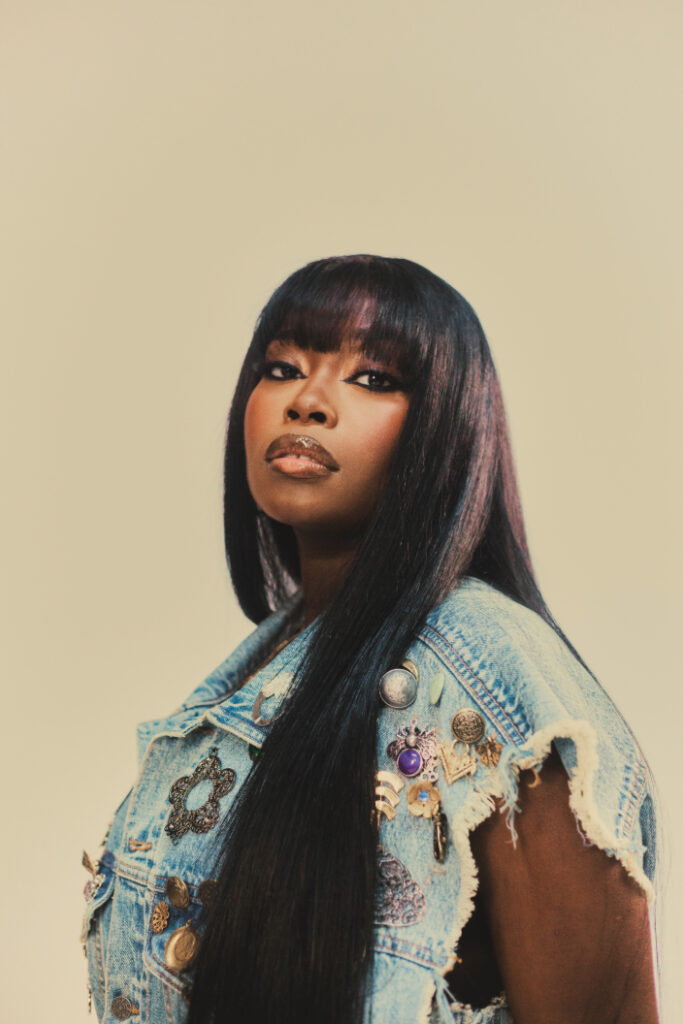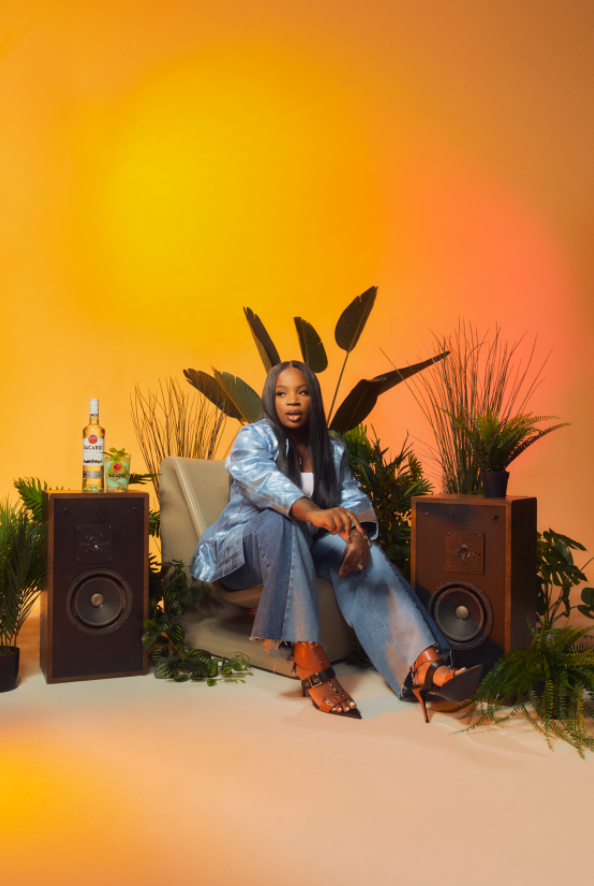Though SXSW has long past, the shadow of AI’s presence in music remains a mysterious new. Two artists on the first EP created by AI speak up.

By Cy White, Photos courtesy of BACARDÍ Music Liberates Music
The past couple years in music have been…a roller coaster, we’ll say. With an astounding resurgence of artificial intelligence, and what seems like an intentional drive to make content creation to be, at best, more universally accessible to non-creatives, at worst, a means to remove the human element from art (mainly as a way to save money for major corporations), the discourse has been a bit all over the place. The place it hasn’t really been is from the perspective of the artists making music.
There’s so much misunderstood and exaggerated about the significant role AI currently has in the creative process. From using the technology to create songs from scratch (not exactly a new concept, see GarageBand, FL Studios, Abelton, etc.) to using it to strip actual vocal performances from songs to give the illusion of artists singing completely different songs (created from scratch or already a chart-topper), the scope of what AI is capable of continues to a fascinate and frighten.
Where are the artists in all of this? Well, back in December 2023, the collaboration between beverage brand BACARDÍ and one of the most lauded producers of the past decade, Boi-1da, shifted the conversation. Aptly titled Concept A.I.bum, the EP enlists five talented artists to work with the technology. Boi-1da stated in a press release, “I’m grateful to have worked with BACARDÍ on a revolutionary new way to collaborate with artists from all over the world. Through the power of generative AI, I was essentially able to be in multiple places, working on multiple tracks, simultaneously. The results speak for themselves.”
While most of the attention falls, rightfully, on Boi-1da’s shoulders (he is, after all, a producer who builds and composes the work that other artists will lend their voices to), the artists have rarely spoken about the process and how their own perceptions were challenged during the experience. During SXSW, the entire creative team behind Concept A.I.bum collaborated on a panel to explain the entire concept and field questions from fans and music industry experts. After the conference, two of the artists, R&B songstress Savannah Ré and artist Bellah, shared their thoughts on the experience.
The Album
The collaboration between organic and inorganic on the Concept A.I.bum is fascinating to dissect. In each example, the specter of the AI’s guide flits in and out of one’s aural periphery. That being said, each song works. They’re easily listenable and still heavily guided by Boi-1da’s signature style of muffled bass-deep R&B. Each also manages to find a way to capture the aesthetic of the artist it was meant for. Kyle Dion’s “All You Wanted” is a Kyle Dion song. It has all the markers of the artist’s technically rich yet somewhat unhinged take on the genre in which he swims so effortlessly. The Bellah song is a Bellah song—lovely R&B that leaves considerable room for the vocalist’s abilities. Savannah Ré’s is Savannah Ré. There’s no copy/paste, rather an interesting give-and-take between technology and creative.
Bellah

UK R&B songstress Bellah opens the album with a bit of melancholy—a love-lost, or rather love-left, midtempo R&B track. The groove holds very true to what one would expect of R&B. The guide sits there in the background. A sort of sketch of what one would expect from current R&B-pop fare, but it never gets in the way. The young artist—whose earliest memory of music is taking part in a Beatles roadshow on the West End as a child—allows that while she came to the experience with no concept of making music with AI, her involvement allowed her to recognize that this is simply the next step in music-making’s evolution.
“It was good; it was strange,” she admits. “It was a learning situation, and it was interesting. Technology has advanced music so much. Things that I believe are everyday tools to make music…Like I wouldn’t go to a session or go set out to make music without some kind of interface like a Logic or Fruity Loops or a Pro Tools or Ableton. I think, if we don’t have that, then what are we doing? But, hey, at one point, those things didn’t exist either,” she says. “These programs have become my norm. I had to kind of rejig my brain to think that maybe in the next 10 to 15 years, AI might be music’s norm.”
It’s a bold statement to make, considering the whispers throughout the creative community about what that could actually mean for them, in terms of self-expression. However, Bellah emphasizes that this isn’t a plug-and-play type of situation. All the creative direction is still firmly in the hands of the creative.
“It did teach me that I still had a lot of control,” she says. “And it wasn’t like, ‘Hey, AI, make this song for me, and this is what I want to say.’ It was definitely a collaborative effort.” A collaboration she tries to ensure doesn’t leave the creative dormant, waiting for their moment to assert their voice. “AI can’t tell stories the way humans can tell stories,” she says firmly. “AI learns; it doesn’t feel. So I think music is always going to be in a safe space because of that. [AI]’s nowhere near as sophisticated enough to become sentient and start going through real-life experiences and putting them into song or into music, art. That comforted me,” she admits. “But it only comforted me after the fact of, ‘Oh, I’ve done this and it didn’t hurt.’”
Much like the general public has heard about the AI tools used to produce writing of various lengths and forms, Bellah recounts that this particular AI is more of an aggregating tool that notices patterns and applies them to a guide that will serve as a launching point for the producer and artist to create the track. “It’s one of those kinds of things where, if you use it practically and still have your creative mark on it, you’re not doing anything different than using the splice, essentially.
“Everyone should use it once,” she says. “If they’re serious about music, I think everyone should use it once, because, again, I’m talking about democratizing something, accessibility. If someone who doesn’t have Boi-1da wants Boi-1da on a track, this is perfect. You may have to pay a fraction of the price for the program. Then you get to play around, which is fun, yeah?”
Savannah Ré
A self-professed nerd, Savannah Ré is deeply connected to her craft as a writer. So it’s always been crucial to her artistry to be able to control the narrative. “I really just love that something creative and new is being built,” Ré says. “Then Boi-1da and BACARDÍ really took the time with a program that was about us being in control, not the other way around.”

Her track with Boi-1da, “Hall of Fame,” has a darker shade than the others on the album. This is the AI’s understanding of Boi-1da’s production versatility. From the brightness of Bellah’s opening track, the quirkiness of Kyle Dion, to the molasses-thick burn of Savannah Ré’s work. It’s all part-in-parcel to making the AI work for the artist, as opposed to the artist taking a backseat to the technology. It’s an aspect of this venture that Ré truly gravitated toward. The diversity of sound, structure and vocal collaboration that culminated in an EP that has set the standard of what it looks like to work symbiotically with technology.
“We’re still in control,” she says, voice firm and clear, “not the other way around. It’s not like this program’s taking from us. We’re tapping into this program, and it is finding ways to, with our conditions, literally make it easier.” Boi-1da has said in several conversations about his use of this new technology that it really is a means for him “to do a hundred things at once.” It’s a sentiment that he’s had throughout the entire process—from conception to the EP’s release on the world.
“He said it basically…allowed him to literally touch new artists he wouldn’t have really been able to,” Ré says. “They could be in Toronto. They’ll be in the UK, and you have this program that is informed. You are able to decide what goes into the program, now connecting you to these artists.
“Everything new can be scary,” she continues. “I get it. I myself was like, ‘Oh, no, no.’ Now that I’ve used it, I think about it now, honestly, as any other new invention of the 20th century.” As she mentions, it’s not so unlike each advance in technology, each generation being introduced to the radio, then cassette tapes, then CDs, then digital file sharing. “I’m sure somebody during [that time]was like, ‘No, no, no, no, this is crazy!’ These are all the things that they say about AI. Now we’ve come to have it integrated into pretty much every single song you hear on the radio. I think it just takes time to change people’s minds, but it’ll certainly evolve over time.”
AI Is Here to Stay
As most people have said for the past six to eight months, AI isn’t going anywhere. Its prevalence does raise some ethical questions, particularly when it comes to using intellectual property (and more alarmingly in some cases, actual artist’s voices). With that in mind, it’s even more crucial in these times to seek counsel from the artist’s who are most directly being affected. BACARDÍ had the foresight to do just that and take the tech to the creatives, allowing them to get a hands-on understanding and perhaps spark a new creative fire. At the very least, projects like the Concept A.I.bum go a long way in showcasing how man and machine are fully capable of working in tandem instead of in opposition.
“From a technological standpoint, I feel like now, especially when it comes to technology, let’s go deep,” Ré says. “As an artist myself, I am just excited for the possibilities right now. We have never been where we are now with creative technology. So I’m looking forward to what’s next. Of being able to create an easier flow of even doing things as an artist. Maybe I’m an artist and just starting out and don’t have many options for producers. Well, here’s this producer-run program where you can now take your ideas and [they]become something real. I’m just excited about the future of technology within creative spaces.”

1 Comment
Программа наблюдения за объектами – это современный инструмент для обеспечения безопасности , объединяющий технологии и удобство использования .
На веб-ресурсе вы найдете подробное руководство по настройке и установке систем видеонаблюдения, включая онлайн-хранилища, их сильные и слабые стороны.
Облачное видеонаблюдение
Рассматриваются гибридные модели , сочетающие облачное и локальное хранилище , что делает систему универсальной и эффективной.
Важной частью является описание передовых аналитических функций , таких как детекция движения , распознавание объектов и дополнительные алгоритмы искусственного интеллекта.